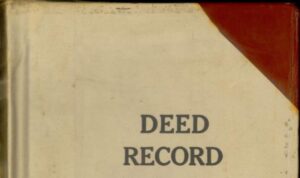
Chain of Title
A “chain of title” report is a report prepared by a Title Company showing the complete ownership history of real property. It should always reflect continuous, unbroken ownership.
“Chain of title” is the ownership history of a parcel of real property, from the first owner to the present owner. Black’s Law Dictionary, 10th Ed. p. 278 (2014).
The chain of title for a parcel of land should go without interruption from the present day back to the original United States government land patent.
Why is chain of title important? It is important because the current owner of real property must have good, or “marketable,” title to be able to sell the real property. Every prior conveyance of the real property must have been proper. Any problem in the chain of title—regardless of how far in the past—may invalidate the ownership interest today and make the real property non-marketable.
“A marketable title must be free from any reasonable possibility of future litigation which may be necessary to remove apparent or real defects, free from reasonable doubt, and not clouded by any outstanding covenant or conveyance.” Sabin v. Rauch, 75 Ariz. 275, 279, 255 P. 2d 206 (1953). The question is whether there is a reasonable doubt about the title and the owner would be hampered in marketing the real property. Id.
Usually, a chain-of-title report begins by obtaining a Grantor-Grantee search of the same legal description as the vesting deed shows. The “vesting” deed is the deed by which the owner acquired title – it is the deed received when the owner bought the real property.
The Grantor-Grantee index in the Recorder’s Office is the official index for providing record notice of conveyances of a property. When Title companies conduct the review of title records, they check to see that the document is a valid conveyance (it should contain a Grantor, Grantee, description of the property, and signatures of all the Grantors). Then, for each document, they determine the following:
- what legal interest was conveyed?
- what real property was conveyed?
- what type of transaction took place?
- who the parties were?
- whether the Grantor/s were all titleholders of the real property; and
- whether the Grantor reserved any interests or made any new conditions, covenants, restrictions, or easements on title to the real property.
For help with real property issues in Arizona, including Chain of Title, contact us.
